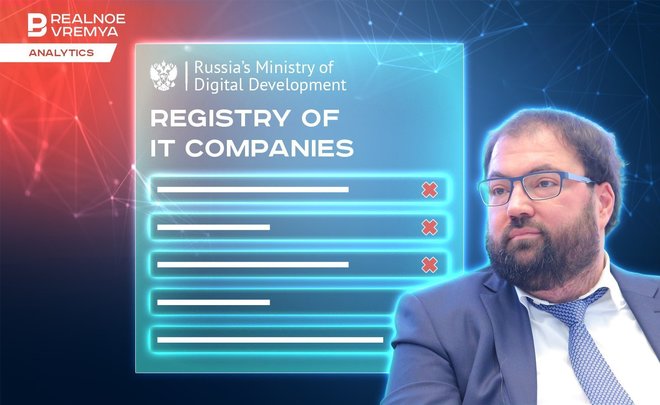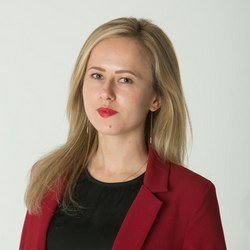Not on active list: IT companies deprived of state support
Maksut Shadayev cleaning up IT companies accredited in 2022

Unprecedented support measures for the IT sector were announced in Russia for the first time in 2022 — tax preferences, exemption from army and mobilisation and a preferential mortgage. To qualify for these bonuses, it was necessary to join the Russian Ministry of Digital Development’s registry of authorised companies. All IT companies wanted to be on the list and even those that were indirectly related to this sector. Last August, the ministry removed more than 30 big banks and several insurance companies from the registry, including Sber and Alfa-Bank, while in autumn it started to deal with IT companies for whom authorisation rules seriously tightened. Start-ups and IT services began to leave the registry in January 2023. Realnoe Vremya’s analytic staff figured out why the state decided to cut the list of candidates for the benefits.
As Realnoe Vremya found out, several IT companies of Tatarstan received emails from State Services in late January saying that their state accreditation was annulled. The absence of their consent to disclose tax secrecy to the Russian Federal Tax Service was the formal reason for this. The Russian Ministry of Digital Development admitted that the situation could be a mistake of information delivery and offered the IT companies to apply for the accreditation again according to instructions attached to the letter. A handful can be among benefit recipients according to the new rules.
Salvation from army and mobilisation
The accreditation in the Ministry of Digital Development is needed to qualify for various benefits announced by Russian President Vladimir Putin on 2 March 2022. To make sure IT specialists stayed and didn’t leave the country, they were promised tax preferences, exemption from military service and a preferential loan. The accreditation process in the ministry was simple enough — to apply via the State Services, but the company must meet certain requirements — 90% of its incomes must come from IT activity (later, this figure was reduced to 70%), while the staff must have at least seven people. Later, exemption from mobilisation was added to the benefits for IT companies.
“At first, the accreditation was provided automatically,” Russia’s Minister of Digital Development Maksut Shadayev explained. “It turns out any company can add the necessary classification of activity and make it to the list of IT companies, which allows employees to get exemption from military service.”

Many companies hurried up to take advantage of such an opportunity. As a result, several big banks, for instance, Alfa-Bank whose press service reported on this on 4 July, were among IT companies qualifying for the benefits. Alfa-Bank noted that 8,000 IT specialists worked there, therefore the organisation considered itself as an IT company. Sberbank was accredited as an IT company too. Also, even hospitals, health resorts and non-related factories managed to be on the list of accredited companies. However, as early as August, the ministry started to clean the registry and annulled the status of 32 banks and 12 insurance companies excluding Sberbank, VTB, Alfa-Bank, Tinkoff, Otkritie, Raffaisenbank, MTS-bank, Gazprombank, MCB and others from the registry.
The alarm went off for IT companies too in late August, they unexpectedly received a chain mail that their accreditation had been annulled. Then, the Russian Ministry of Digital Development cited a technical error and promised that those who received such a message wrongly would be sent a letter of refutation from the State Services soon. Indeed, IT companies had the time just to be scared in August — they were returned the accreditation.
However, in September, the ministry announced new, stricter standards for being in its registry. A new form for accreditation of companies appeared on the State Services. Now it can be obtained only if the main activity of the company complies with one of the necessary activities, employees’ salaries aren’t below the average in the region or across the country (but this rule doesn’t apply to the companies with an income above a million rubles whose products are in the registry of Russian software). More than 30% of incomes of the company must come from IT activity. Start-ups that are younger than 3 years and whose income hasn’t topped a million rubles yet are an exception. Also, the website of the company that wants to obtain the accreditation must contain information about its IT activity and it is obliged to agree to disclose data that is tax secrecy to the Federal Tax Service. Accredited companies were obliged to submit such consent before 31 October, otherwise, they were promised to be removed from the list.
The IT companies on the registry that didn’t meet the new standards had a chance of keeping all their benefits if they raised their average salaries or joined the registry of Russian software.
At a webinar for IT companies, Maksur Shadayev explained that it was necessary to confirm the income and average salaries with documents until 1 June 2023. If the company has salaries below the average in the region, it has the right to register its product in the registry of Russian software. In this case, the requirements for payouts won’t be considered. And if there is nothing to register in the software registry, the company will anyway have to raise the average salaries, the minister explained.
Realnoe Vremya asked the Tatarstan Ministry of Digital Development that 831 IT companies had the accreditation as of 1 January 2023. It is impossible to have a look at the remaining number of Tatarstan companies in the registry after the January clean-up — the registry is no longer in public domain.
“This isn’t very friendly, especially towards small companies and start-ups”
“Like many companies we received a notification of the Ministry of Digital Development from the State Services that our accreditation was annulled. My colleagues assumed it was a mistake like before and the accreditation would quickly be reinstated. However, it didn’t turn out to be the case,” start-upper Alexey Talan who founded click-storm.ru cybersport platform told Realnoe Vremya.
According to Talan, they called the tax service and quickly found out that the company’s consent for tax secrecy disclosure was submitted correctly as early as 13 October and delivered to the Ministry of Digital Development according to the rules that were in force at that moment. However, the ministry introduced a new requirement soon: the application for the tax secrecy disclosure must contain the code 20009. Talan didn’t add this code because he had submitted the application before such an instruction appeared, and he didn’t receive any feedback from the ministry that his application was inconsistent.

“Since we have a cybersport start-up, I will put an example from cybersport. So we play a tournament match on the stage in the final, and a patch completely changing the rules goes on at its height. For instance, now a team needs six players, not five, and another one is urgently needed. With a computer, a table and a gaming chair. If you didn’t find him or her in five minutes, you lost,” he draws an analogy. “Tournament organisers shrug and offer ask developers all the questions. While the developer replies that he issued the notification two minutes ago that the rules would change, so he is not held accountable. Are you going to come to such a tournament and such organisers? You will maybe think twice. Perhaps, my question is harsh a bit, but the working conditions are too now.”
“They simply categorically crossed us out from the registry”
Another Tatarstan IT company faced the same problem — TCS cloud service operating today in Russia and abroad. TCS’s CEO Rustem Mukhametshin confirmed that he also suffered from submitting an application for tax secrecy disclosure without the code 20009.

IT companies were informed that they needed to send their consent for the first time on 30 September 2022 and were given a month to submit the documents. “We submitted our consent on 7 October but didn’t indicate the code 20009 — it is information disclosure for the Ministry of Digital Development. The instruction that read that this code needs to be indicated was issued on 13 October only. Somebody says now that it appeared on 10 October, some talk about 21 October,” Rustem Mukhametshin recalls. “We submitted long before and we weren’t notified that this needed to be fixed. They simply categorically crossed us out from the registry. According to President of Russia Vladimir Putin’s decree, 2023 was the last year when the decreased tax rate was applied for IT companies in the simplified taxation system (1% instead of 6%), we really counted on it but this remained a dream. What’s more, if there is a new wave of mobilisation now, all bets are off.”
According to him, volunteers collected data about everybody who lost the accreditation wrongly and send a letter to Minister of Digital Development Maksut Shadayev. “There has been no reply yet, I learnt even this information from a representative of volunteers. If not him, I wouldn’t have received any feedback,” Mukhametshin says. “Today people are writing about some form and an email in chats where one needs to write a letter that we were deprived of the accreditation illegally or by mistake. There is no feedback. There is no deadline. When I managed to contact the Ministry of Digital Development, I was told there was no procedure of returning to the registry, start again. We are not against, but when the mobilisation started, two new requirements were introduced: it is necessary to have the average salaries we don’t comply with and our software isn’t in the registry of Russian software yet. We, IT companies that hadn’t been in the registry of accredited companies before the mobilisation, were promised not to be bothered until July 2023. We were preparing to join the registry of Russian software by this time and meet one of the requirements that would be enough to confirm the accreditation as an IT company.”
The volunteers’ address, according to him, has two petitions now — to cancel the wrong annulment or permit obtaining accreditation again, without considering the two new parameters that appeared during the partial mobilisation.
There is no information yet if they can regain the accreditation. But the TCS CEO hopes that the Russian Ministry of Digitalisation will anyway meet those who lost it by mistake halfway because there is a big number of such companies.
“It is unknown how this magic works”
Such a problem is topical for many, Realnoe Vremya was confirmed anonymously in a company that has outsourced accounting and helped five IT companies from Tatarstan to submit their consent on tax secrecy disclosure to the Federal Tax Service: “From 12 to 19 October 2022, we submitted five consents of accredited companies, followed the instruction of the Ministry of Digital Development and relevant channels. All the consents were accepted by the tax service, we have protocols on acceptance,” a representative of the company said. “All the consents include the period of 2022-2023 and even there is the code 20009 of the Ministry of Digital Development. But three out of five companies were anyway removed from the registry. It is unknown how this magic works. But the exclusion in such cases looks illegal. Instructions and forms constantly changed either in the Ministry of Digital Development or electronic document exchange operators.”
We cannot say that only Tatarstan suffered. Viktor Volkov, director of Sekvoy Lab from Kuzbass, said that he also received a notification on 27 January that their accreditation was annulled.

The registry clean-up will continue
MRG’s leading analyst Eldar Murtazin thinks that the Ministry of Digital Development will continue cleaning up the registry of IT companies.

However, Alexandra Sevostyanova, head of hh.ru’s press service in the Volga district, is not so categorical. There were about three CVs per vacancy on average in IT in Tatarstan in January 2023. In 2021, there weren’t more than two CVs per vacancy.

The press service of the Russian Ministry of Digital Development promised Realnoe Vremya to sort out every accreditation revocation case individually.